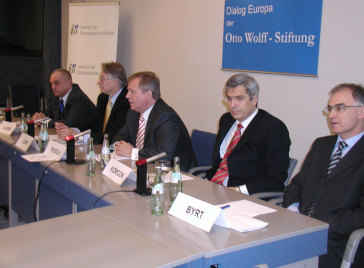The Past and Future of Visegrad Cooperation

On 22 February 2006, the Institute for European Politics and the embassies of Poland, Slovakia, the Czech Republic and Hungary presented a podium discussion on the topic “15 Years of Visegrad Cooperation”. The ambassadors of the four Visegrad countries to Germany reported their experiences with Visegrad cooperation and discussed their ideas about future perspectives.
Visegrad cooperation is a loose arrangement of four states – the Czech Republic, Hungary, Poland and Slovakia – that goes back to a declaration that was signed on 15 February 1991 in the Hungarian city of Visegrad. As the namesake of the Visegrad group, the city has a high symbolic significant: It was here in 1335 that the kings of Bohemia, Poland and Hungary met and agreed on close cooperation. Ambassador Peisch noted that the “three statesmen of the transition” – Walesa, Havel and Antal – gave clear signals at a 1991 meeting in Visegrad that the future of their countries lay with Europe.
One of the core questions during the podium discussion was the future of Visegrad cooperation now that the main goals of NATO and EU accession have been accomplished. All ambassadors were in agreement that the cooperation of their four states continues to be a part of their national interests. In fact, the liberation from the monotonous theme of EU accession makes easier an internal focus on things like environment, emergency management, culture and many other policy areas in which cooperation brings tangible results.
The recipe for success in this area is especially a low degree of institutionalization, which, despite all of the joint initiatives, still allows for divergence in individual issues. The presidency, currently held by Hungary, rotates between the members, and there is no secretariat. The work of the group is primarily conducted by national coordinators, and the driving force is common historical experience and close cultural similarity, evidenced by cross-border traditions and of course family connections.
S.E. Dr. Andrzej Byrt, Ambassador of the Republic of Poland:
“The EU today is much more European than the EEC or the EC ever were. The states that are still absent will have to wait, but they will make further progress. Even the Lukaschenkas of the world will disappear some day.”
S.E. Ivan Korcok, Ambassador of the Republic of Slovakia:
“Visegrad cooperation is still sensible even after EU accession, but it would be naive to think that Visegrad could develop into a power factor in the EU. European integration is not a combination of isolated, self-styled groupings working against one another. That would not function. In addition, the interests of the different Visegrad states diverge in some questions.”
S.E. Boris Lazar, Ambassador of the Czech Republic:
”The biggest mistake both in the unification of Germany and the EU enlargement was that only western democratic experiences were relevant. But it follows from systemic theory that, when two systems are united, something entirely new is created. The more progressive part too must adapt.”
S.E. Dr. Sandór Peisch, Ambassador of the Republic of Hungary:
“We need more attention to be paid to the European Neighborhood Policy, because it is worth it. The Visegrad group is glad to share its experiences in the transformation process with states in the European neighborhood, because, when our neighbors our doing better, we too are doing better. In Europe no white spots should be allowed to form on the map.”